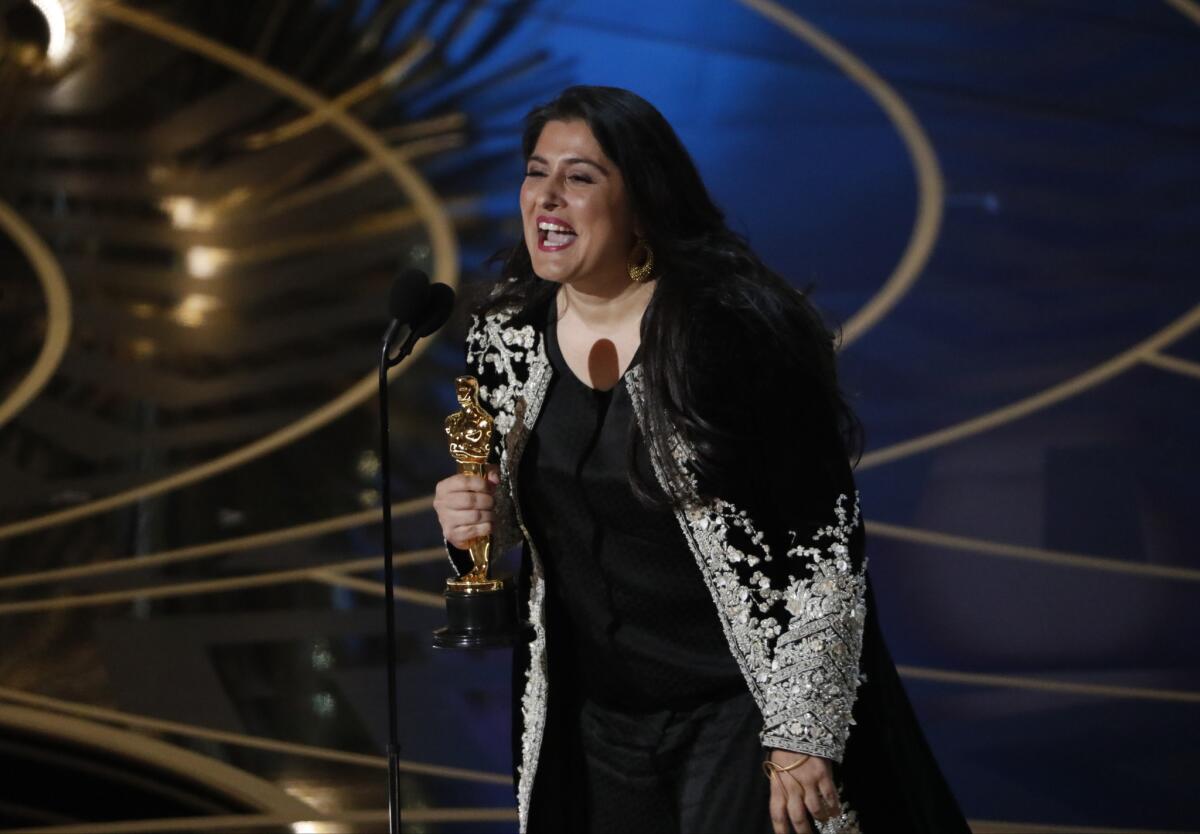After Oscar-winning film on ‘honor killings,’ Pakistani director finds a happier note: jazz

- Share via
Reporting from Mumbai, India — The news from Pakistan is often bad. Suicide bombers killing civilians. Islamist radicals gaining influence. Hunger and disease stalking teeming cities and tumbledown slums. Endless government corruption and mismanagement.
Pakistani filmmaker Sharmeen Obaid-Chinoy has not shied away from telling stories about Pakistan’s myriad challenges — and has drawn the ire of some Pakistanis who accuse her of perpetuating a negative image of their country.
In 2012, she won the Academy Award for “Saving Face,” a documentary about women who had survived acid attacks. She followed that up in February with another Oscar win, for “A Girl in the River: The Price of Forgiveness,” a short documentary about a young woman who survived an attempted “honor killing” — one of hundreds that occur every year in Pakistan — after marrying a man her father didn’t approve of.
Obaid-Chinoy’s latest film, codirected with Andy Schocken, tells the happier story of a group of Pakistani classical musicians who taught themselves to play jazz, found fame on the Internet and performed at Lincoln Center in New York with jazz great Wynton Marsalis.
But even the inspiring “Song of Lahore” — buoyed by sprightly jazz tunes — has a sad underside. A declining audience and decades of opposition by religious extremists have all but killed off the artists’ craft. Young Pakistanis these days struggle to find jobs, and making classical music is not seen as a viable way to make a living.
One violinist, Saleem Khan, says in the film that he wanted his grandchildren to learn to play so the tradition didn’t die with him. In an interview from New York, Obaid-Chinoy said she hoped the film would serve in part to preserve a fading piece of Pakistani heritage.
Why did you want to tell a story about Pakistani jazz musicians?
I grew up listening to my grandfather’s stories of a very different Pakistan, where music was played on the streets and you had large orchestras and public performances. When I stumbled upon this group of musicians, I thought, through them we can tell the story of our musical past but also the potential that musicians have to transcend language, culture — and let this music speak for itself.
Do you think this art form has died in Pakistan, or is there still an audience for it?
The instrumental musicians find it very hard, because we don’t have any formal music schools in Pakistan. Music is passed from father to son, in classical music especially. The musicians who are featured in the film, they have all learned their music from their fathers or their uncles. There is a real danger that they are not going to pass their musical abilities on to the next generation because there’s just not enough money to be made in the business. And with that, our instruments will become silent, and there will come a time where you will not have anybody who knows how to play a sarangi [classical string instrument], who knows how to play a violin.
We often think about traditional music dying out because of modern influences, but in this case it was the Internet that helped save these artists. Did that paradox attract you to the story?
What attracted me was the story of these musicians and the fact that it needed to be told. There are so many in Pakistan who don’t realize our rich musical history. It’s not that music has died in Pakistan — we have flourishing pop musicians. But our heritage, our grandparents’ music, the music of the subcontinent — that music seems to be dying.
What was the most surprising thing about traveling with these musicians to the U.S.?
The personalities of the musicians really come alive when they touch down in New York. You see them feeling much more relaxed, you see them in Times Square interacting with people. One of the things people who watch this film tell me is the musicians have personalities — they make you laugh, their observations are quirky. People connect with them. But throughout the rehearsal period, the tensions that were there, the fact that these musicians can’t read music, they don’t speak the same language as Wynton Marsalis’s band — all of that came to a head. There was a time in the rehearsal when we didn’t know how the concert was going to turn out.
Last week it came to light that a Pakistani journalist, Zeenat Shahzadi, disappeared in Lahore after she began investigating the story of a missing Indian citizen. Is it getting more dangerous to tell controversial stories in Pakistan?
The Indian subcontinent as a whole is very dangerous for journalists... who want to push the status quo. The statistics across the board show that the kind of intimidation that is used is very similar in many of the countries.
What do you say to people who accuse you of spreading only bad news about Pakistan?
Journalists and documentary filmmakers hold up a mirror to society. That reflection is not always pretty, but it’s important to do so, because there is introspection, there is reflection, there’s a conversation that takes place to find a remedy. My films are not just about the victims and the survivors, but they’re also about the heroes — the doctors, the lawyers, the police officers who go beyond the call of duty to aid them. I think my films have started an important discourse in whichever country where I’ve made them.
Pakistani Prime Minister Nawaz Sharif pledged to strengthen laws against “honor killings” after watching “Girl in the River.” Have you seen any signs of change?
A standing committee has been set up in parliament, and many of the political parties are on board to change the law. There has been pushback from the religious political parties. It may be a while before the law is passed. But in Pakistan, every time an honor killing is reported, it is now headline news, there are news shows dedicated to it, editorials. The discourse has begun, and I am hopeful the law will get passed. But as we all know, in politics, laws that pertain to women are always left until the end.
“Song of Lahore” opens Friday at Laemmle’s Music Hall in Beverly Hills.
Follow @SBengali on Twitter for more news from South Asia
More to Read
Sign up for Essential California
The most important California stories and recommendations in your inbox every morning.
You may occasionally receive promotional content from the Los Angeles Times.













